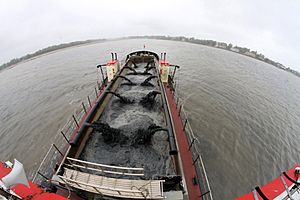Bennett Creek (Nansemond River tributary) facts for kids
Bennett Creek, also known as Bennett's Creek, is a small waterway in Suffolk, Virginia. It flows for about 7.3 miles (11.7 km) and eventually joins the Nansemond River. This creek is an important part of the local environment and history.
Bennett's Creek is also home to a fun park called Bennett's Creek Park. This park has many things to do for families and friends:
- Two free boat ramps that lead to the Nansemond River.
- A playground for kids to enjoy.
- Tennis courts for playing sports.
- Clean restrooms and three covered shelters you can reserve for parties or picnics.
- A nature trail where you can explore the outdoors.
- Open fields for games and activities.
- A fishing and crabbing pier that is easy for everyone to use, including those with disabilities.
You can also find a 2.6-mile (4.2 km) canoe trail at the park's boat ramp. This trail goes through a peaceful salt marsh, which is a special wetland area. Along the way, you might spot amazing wildlife like otters, raccoons, and osprey (large fishing birds). The trail ends where Bennett Creek meets the Nansemond River.
Contents
History of Bennett Creek
The area around Bennett Creek has a long and interesting history.
Early Native American Life
Before European settlers arrived, the land around Bennett Creek was home to the Nansemond Indians. They lived here for many years, using the creek and river for food and travel.
First European Settlers
In the 1600s, European settlers began to arrive. On June 26, 1635, land around Bennett Creek was given to a group of people called Puritans. Puritans were a group of Christians who wanted to make changes to the Church of England.
One important Puritan leader was Richard Bennett. He later became the first Puritan governor of Virginia after the English Civil War. A governor is like a leader of a state or colony. Richard Bennett's home was located right on Bennett Creek, and today you can find a historical marker showing where it once stood.
Forming Nansemond County
In 1637, the area including Bennett Creek became part of a new county. It was first called Upper Norfolk County. But in 1646, its name was changed to Nansemond County, honoring the Native American tribe who lived there.
Battles and Conflicts
The Bennett Creek area saw some fighting during important wars.
- In May 1779, during the American Revolutionary War, a small battle happened near Bennett Creek. Virginia soldiers fought against English troops. The English then moved on to attack and burn the nearby town of Suffolk.
- During the American Civil War (1861-1865), soldiers built strong defenses with cannons near Bennett Creek. However, Union (Northern) troops captured the area by May 1862. This happened shortly after a famous naval battle, the Battle of Hampton Roads, where the ironclad ship CSS Virginia fought against U.S. Navy ships. The mouth of Bennett Creek was close enough to see this battle.
Unfortunately, many old records about Nansemond County's history are missing. The court records were destroyed in three different fires, making it hard to know all the details of the past.
 | Bayard Rustin |
 | Jeannette Carter |
 | Jeremiah A. Brown |


